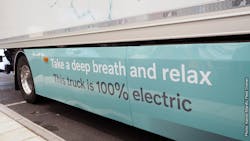Ever since our first Guidance Report, Electric Trucks — Where They Make Sense, came out people have been asking me when I think we will see widespread adoption of electric trucks.
I don't have an answer for that but I can tell you that it is very difficult to plan for disruptive change. And let’s face it electric trucks qualify as a disruptive technology. The adoption of most new technologies, whether in trucking or elsewhere, follow an S curve with phases labeled with things like innovators, early adopters, early majority, late majority and laggards.
However, it can be difficult to determine exactly when a technology will hit its tipping point and become mainstream. Today there are a lot of people that say it will take many years for electric trucks to be seen in any real numbers because too many other things have to change.
But it is possible that a rapid change in the market can happen with electric trucks, possibly faster than expected and with broader ramifications. Such a change is not unprecedented. Between 1940 and 1960 we completely changed from steam engines powering trains to diesel-electric trains (80% in 20 years). Massive changes to infrastructure of freight movement occurred. Some companies disappeared, but new companies sprung up. Some jobs completely changed, new ones developed and some disappeared. The same could happen with electric powered trucks.
The point is we adapted to a significant change in a relatively short time span. And we have to remember that we are not the only industry looking at electric power. Siemens predicts electric propulsion of airplanes will be standard by 2050. Parallel development of the same (or similar) technology in different industries can accelerate growth across all industries.
There are already electric buses and electric cars on the road, and there are lessons trucking can learn from these applications of electric technology.To be clear, I am not saying that when you wake up tomorrow most new trucks on the road will be a battery electric vehicle. However, I am saying that I don’t think we are in the “blue sky” phase with battery electric vehicles in commercial applications. We’ve hit the “when” phase of their development; the “if” is a foregone conclusion. The barriers now seem lower hurdles to overcome than just a few years or even months ago!
Commercial battery electric vehicles will be a factor some day. When that day is no one can say for sure, but you owe it to yourself to start learning about them because you never know when some day will arrive. You don't want to be the laggard on the S curve because at that point you get no competitive advantage from choosing the technology.
About the Author

Michael Roeth
Executive Director
Michael Roeth is the executive director of the North American Council for Freight Efficiency. He serves on the second National Academy of Sciences Committee on Technologies and Approaches for Reducing the Fuel Consumption of Medium and Heavy-Duty Vehicles and has held various positions with Navistar and Behr/Cummins.
